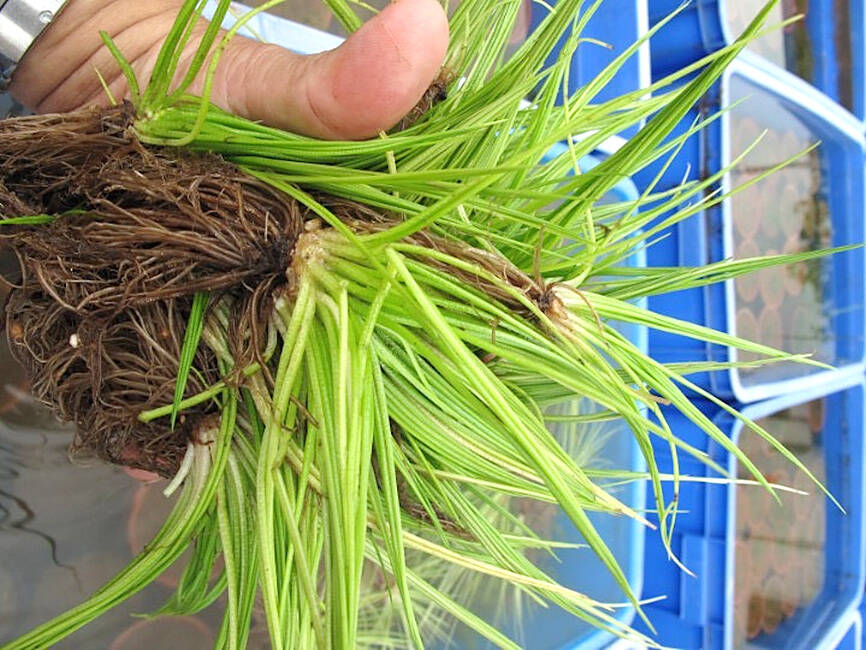Researchers have learned to propagate Taiwanese quillwort, a rare semiaquatic herb that is only found near Menghuan Lake (夢幻湖) on Taipei’s Yangmingshan (陽明山) and which is under threat of extinction.
The endemic plant species (Isoetes taiwanensis), which was discovered in 1971, is only found within an area of less than 0.5 hectares around the lake, Taiwan Forestry Research Institute researcher Huang Yao-mou (黃曜謀) said.
Although it grows in a humid subtropical climate zone, the plant faces threats from drought and competition from other species, which almost led to its extinction in 2006, he said.

Photo courtesy of the Taiwan Forestry Research Institute via CNA
To preserve the species, Huang said he observed the plant for three to five years, during which he found that it released spores in the soil that survive the winter before germinating in the spring.
Cold winter temperatures help activate the spores, with some germinating the following year and others taking up to 30 years, he said.
He experimented by placing soil samples with Taiwan quillwort spores in a refrigerator at 4°C, removing some of the samples every two weeks.
He found that while the plant’s megaspores normally took an average of 12 weeks to germinate, exposure to sustained cold temperatures could reduce that time to as little as two weeks.
Sixty-three percent of the spores germinated after 20 weeks stored at low temperatures, compared with only 26.5 percent in normal conditions, he said.
More specimens also made it to later stages in the plant’s life cycle, allowing them to be used for educational or research purposes, and assisting in conservation efforts, Huang said.
Taiwan quillworts are the first plants in the genus Isoetes to have their genome sequenced, which is useful in studying the special type of photosynthesis — crassulacean acid metabolism photosynthesis — used by them and some terrestrial plants, he said.
As Isoetes in neighboring countries such as China, Japan and South Korea are almost all hybrids of Taiwanese quillworts, the genome data also helps scientists better understand how it evolved, he said.
Huang and his research team published the results of their study on the effects of cold on Taiwan quillwort spore germination in the twice-yearly Indian Fern Journal in December last year.

Taiwan is stepping up plans to create self-sufficient supply chains for combat drones and increase foreign orders from the US to counter China’s numerical superiority, a defense official said on Saturday. Commenting on condition of anonymity, the official said the nation’s armed forces are in agreement with US Admiral Samuel Paparo’s assessment that Taiwan’s military must be prepared to turn the nation’s waters into a “hellscape” for the Chinese People’s Liberation Army (PLA). Paparo, the commander of the US Indo-Pacific Command, reiterated the concept during a Congressional hearing in Washington on Wednesday. He first coined the term in a security conference last

A magnitude 4.3 earthquake struck eastern Taiwan's Hualien County at 8:31am today, according to the Central Weather Administration (CWA). The epicenter of the temblor was located in Hualien County, about 70.3 kilometers south southwest of Hualien County Hall, at a depth of 23.2km, according to the administration. There were no immediate reports of damage resulting from the quake. The earthquake's intensity, which gauges the actual effect of a temblor, was highest in Taitung County, where it measured 3 on Taiwan's 7-tier intensity scale. The quake also measured an intensity of 2 in Hualien and Nantou counties, the CWA said.

The Overseas Community Affairs Council (OCAC) yesterday announced a fundraising campaign to support survivors of the magnitude 7.7 earthquake that struck Myanmar on March 28, with two prayer events scheduled in Taipei and Taichung later this week. “While initial rescue operations have concluded [in Myanmar], many survivors are now facing increasingly difficult living conditions,” OCAC Minister Hsu Chia-ching (徐佳青) told a news conference in Taipei. The fundraising campaign, which runs through May 31, is focused on supporting the reconstruction of damaged overseas compatriot schools, assisting students from Myanmar in Taiwan, and providing essential items, such as drinking water, food and medical supplies,

Prosecutors today declined to say who was questioned regarding alleged forgery on petitions to recall Democratic Progressive Party (DPP) legislators, after Chinese-language media earlier reported that members of the Chinese Nationalist Party (KMT) Youth League were brought in for questioning. The Ministry of Justice Investigation Bureau confirmed that two people had been questioned, but did not disclose any further information about the ongoing investigation. KMT Youth League members Lee Hsiao-liang (李孝亮) and Liu Szu-yin (劉思吟) — who are leading the effort to recall DPP caucus chief executive Rosalia Wu (吳思瑤) and Legislator Wu Pei-yi (吳沛憶) — both posted on Facebook saying: “I